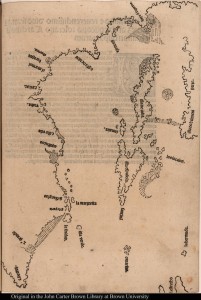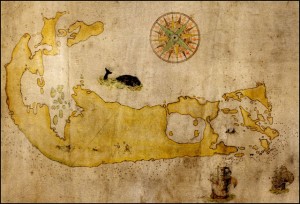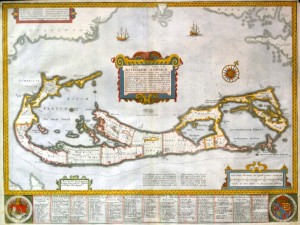[From chapter 3 of Shipwreck and the Global Ecology]
No island is an island.
They are undeniably real things, out there in the ocean, but they do not mean what we want them to mean. Visible, solid structures of coral, rock, and dirt assert stability amid the tumult of great waters. Over human lifetimes, islands remain fixed. But they are never isolate, not since the oceans have become trade’s highways. Isolation is impossible on the global ocean. The symbolic force of islands, their role as havens and helps for lost sailors, never tells the full story. Islands appear as wished-for sanctuaries for shipwrecked sailors, but as in the The Tempest and Robinson Crusoe they often prove as treacherous as the waters themselves. In John Donne’s phrase, “no man is an island” because there is no separation of any human from the divinely-ordained whole: “every man is a piece of the continent, a part of the main. If a clod be washed away by the sea, Europe is the less.” Donne’s famous phrase describes human coextension as a landed, continental phenomenon, in which human belonging to a divine whole fashions a corporate “Europe” matched against the “washing” pressure of the sea. The sailor in the poet perhaps recognized an oceanic countermeaning, in which isolate existence founders not just on continental unity but on thalassic interconnection. The geographic and cultural histories of islands insist that these remote places cannot remain isolated. The pressure to connect that characterizes maritime space, which Mediterranean historians Peregrin Horden and Nicholas Purcell describe through the term “ready connectivity,” helps reimagine oceanic vastness as a system of nodes and spokes. Islands in the deep oceans, their locations mapped onto shipping lanes by the patterns of the trade winds, became newly visible and connected in transoceanic context. Isolated and connected, these islands both cause shipwrecks and rescue survivors.
No location in early modern English history reveals the paradox of the oceanic island more clearly than Bermuda. It appears in historical and poetic records less as island than sea-land, a collection of rocks that is also part of the ocean. The imaginative history of these islands from their poorly documented entry into the European record in the early sixteenth century to their status as long-lived English colonies in and after the seventeenth century produces a literalized metaphor of dual connection to sea and land. As English sailors expanded onto the Atlantic rim, many writers and propagandists extolled the supposedly fertile soil of the New World. Bermuda’s beaches and reefs provide an oceanic counterpoint to this fantasy. The history of Bermuda adds salt-water particularity to England’s early colonial experience, supplementing land-based legends with a story that was disoriented by the ocean, marked by shipwreck, and never straightforwardly progressive. A mid-Atlantic chain of islands and reefs geographically separate from both the connected arcs of the Caribbean islands and the river-fed hinterlands of the North American continent, Bermuda sat near the heart of the early English experience of the Atlantic world. It was the land-sea on which England’s North American ventures first wrecked, and the strange strand on which they salvaged themselves.
The key to a Bermuda-inflected analysis of early English settlement on the North Atlantic rim is the power of oceanic disorientation. As the shipwrecked arrival of the first English settlers shows, this space confounded expectations, resembling neither the utopian fantasies of Virginia Company propaganda nor the riches of Spanish Mexico. The bare sand beaches and gentle climate sheltered the survivors of the Sea-Venture wreck in 1609, and even provided them with enough provisions to rescue the starving colonists at Jamestown when they arrived there, nine months later. But the redemptive narrative of Bermuda that the Virginia Company would trumpet in subsequent years overlooks the alien qualities of the island. Bermuda would become England’s second New World colony, and remains today its oldest colonial possession, but it never produced the bounty the Company wanted. As Michael Jarvis puts it in the opening pages of his award-winning history of the island, In the Eye of All Trade, Bermuda’s perspective on the Atlantic system was comparable to the view “from the deck of a ship.” From this unstable platform, the Americas appear as oceanic as continental. Bermuda’s maritime connections, and eventually its short-lived prosperity during the tobacco book of the 1620s, connected the island to the English economy, but it remained a wet, disorienting outlier.



Leave a Reply